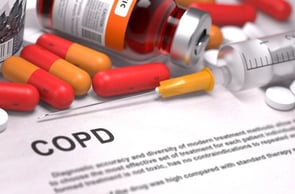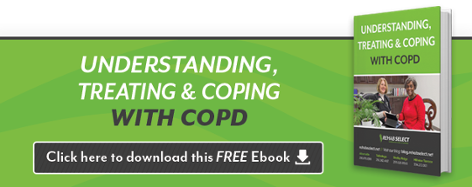 Chronic obstructive pulmonary disease (COPD) affects more than 6.3 percent of American adults. It's a life-threatening lung disease that kills millions of people every year.
Chronic obstructive pulmonary disease (COPD) affects more than 6.3 percent of American adults. It's a life-threatening lung disease that kills millions of people every year.
The disease results in the airflow from the lungs becoming obstructed. Living with COPD is difficult due to the many symptoms that result because of it. These symptoms most commonly include difficulty breathing, wheezing, breathlessness, chronic coughing, and abnormal sputum, which is the mixture of mucus and saliva found in the airways. Living with COPD becomes more difficult as these symptoms worsen, making it difficult to do even the simplest tasks, such as walking up and down a set of stairs.
Although COPD is the commonly recognized name, there are actually different variations of COPD, including three main types:
-
Emphysema
Emphysema causes the alveoli (air sacs) within your lungs to weaken over time, eventually causing them to rupture. This results in one large space instead of many small spaces that are clustered together in healthy lungs. The more damaged your alveoli are, the more short of breath you will become. The surface area of your lungs will also diminish as the alveoli rupture, which in turn reduces the amount of oxygen that reaches your bloodstream.
The main symptom of emphysema is shortness of breath, which can become severe to the point of lips and fingernails turning blue or gray due to exertion. The main causes of emphysema are smoking, air pollution, and manufacturing fumes.
Emphysema cannot be cured, although steps can be taken to relieve symptoms. There are, however, plenty of ways to avoid emphysema – the most effective one being to stop (or to never begin) smoking. -
Bronchiectasis
Bronchiectasis occurs when the walls of your bronchial tubes thicken due to either an infection or chronic inflammation, thereby causing mucus to accumulate within the airways. People that suffer from bronchiectasis often experience lung infections, which in turn cause worsened breathing along with other symptoms like fatigue, shortness of breath, coughing, wheezing, and fevers. Patients will begin losing lung function over the years.Unfortunately, like the other two forms of COPD, there is no cure, but some of the causes include:
-
Allergic bronchopulmonary aspergillosis (an allergic lung inflammation)
-
Alpha1-antitrypsin deficiency
-
HIV
-
Humoral immunodeficiency
-
Inflammatory bowel disease
-
Rheumatological disease
-
-
Chronic Bronchitis
Bronchitis occurs when the lining of your bronchial tubes becomes inflamed. The bronchial tubes are what carry air back and forth from your lungs. While acute bronchitis is often the result of a respiratory infection, chronic bronchitis is usually caused by smoking. Chronic bronchitis causes a productive cough that can last more than three months and that repeats in recurring bouts over more than two years. Symptoms tend to worsen during these bouts and include the following-
A slight fever
-
Thickened and discolored mucus within the bronchial tubes
-
Chronic cough
-
Shortness of breath
-
Fatigue
-
Discomfort in the chest
-
Although acute bronchitis will generally go away without any treatment within a period of two weeks, chronic bronchitis cannot be cured.
Living with COPD in any form can be quite challenging, especially with the knowledge that there are no cures for the three main types. There are, however, many different treatments available that can help alleviate the symptoms of COPD, including medications such as antibiotics (i.e. inhaled steroids, oral steroids, and theophylline), lung therapies (i.e. oxygen therapy and pulmonary rehabilitation) to improve your breathing, and for extreme cases, lung surgery.
Seeking out the proper treatment is vital to being able to live with the disease without letting it drastically affect your quality of life.





